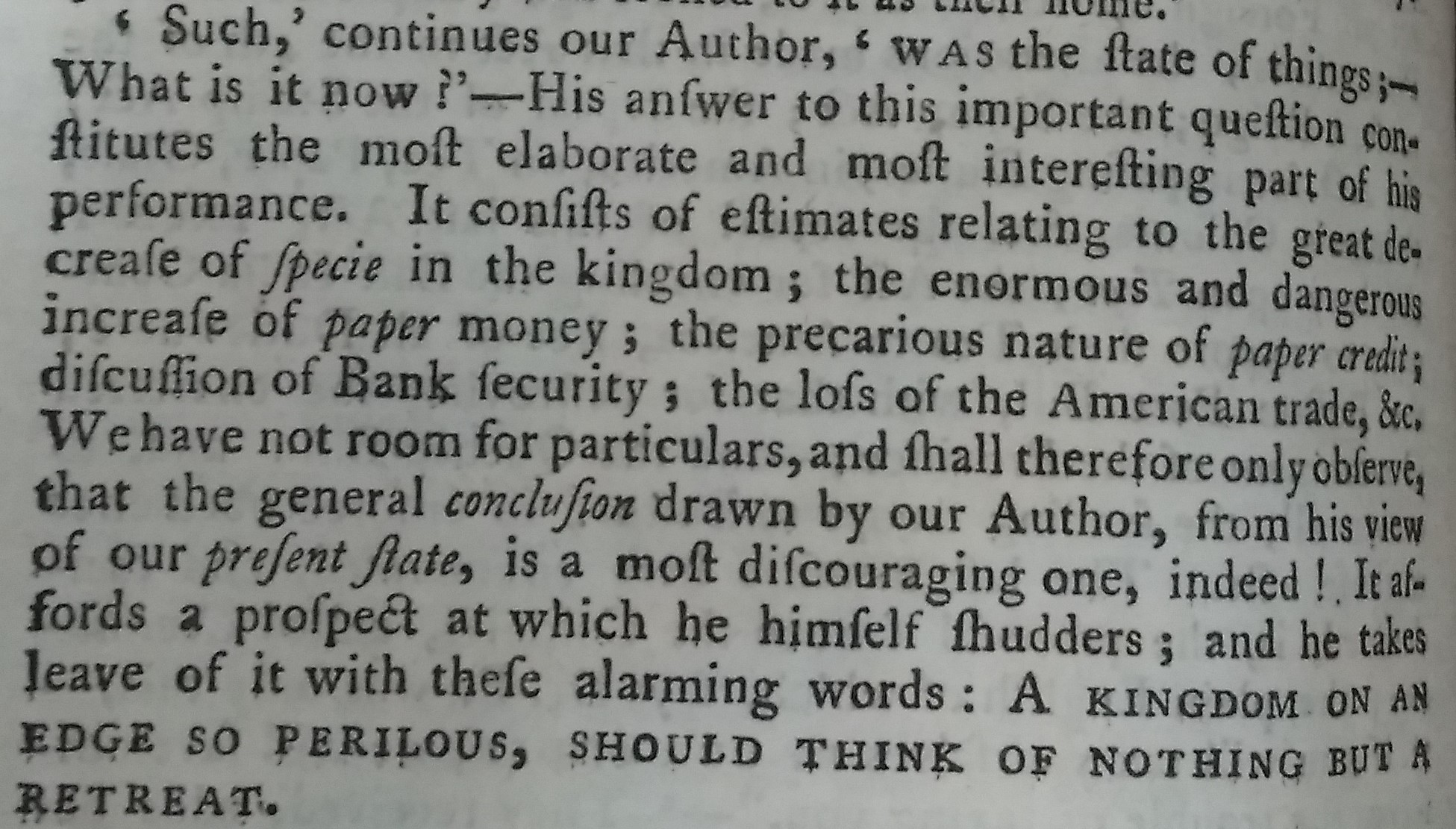Welcome to the sixth, and last for 2020, in this series of blogs that have been appearing every now and then to pique the interest of the wonderful followers of the life of Innerpeffray Library. For those of you lucky enough to have visited the Library, you will have noticed that the shelves really do go from floor to ceiling and, as a result, there are some shelves that really do not get the attention that they perhaps deserve. This series aims to remedy this injustice by dragging out the ladder and going for a quick Tour of the Tops to see what gems there are awaiting true recognition! Unusually for the series, this ‘Episode’ sticks rigidly to one type of book, but, despite this limitation, I can still offer a variety of books! Interest piqued? Well, this ‘Episode’ looks at a selection of late 18th Century book reviews, so we shall read contemporary reviews of books in the Library collection, dive into the cut-and-thrust literary debate around the American War of Independence and have a good chuckle at some of the shorter book reviews presented (whence the inspiration for the title of this ‘Episode’ came!).
Before I begin, I know I normally include the frontispiece of the books that I am looking at, but as I was dipping in and out of a number of different books for this, I thought it would get somewhat boring to be looking at multiple very similar frontispieces, so instead, here is a photo of the Library’s large selection of “Monthly Reviews” and “Critical Reviews”.
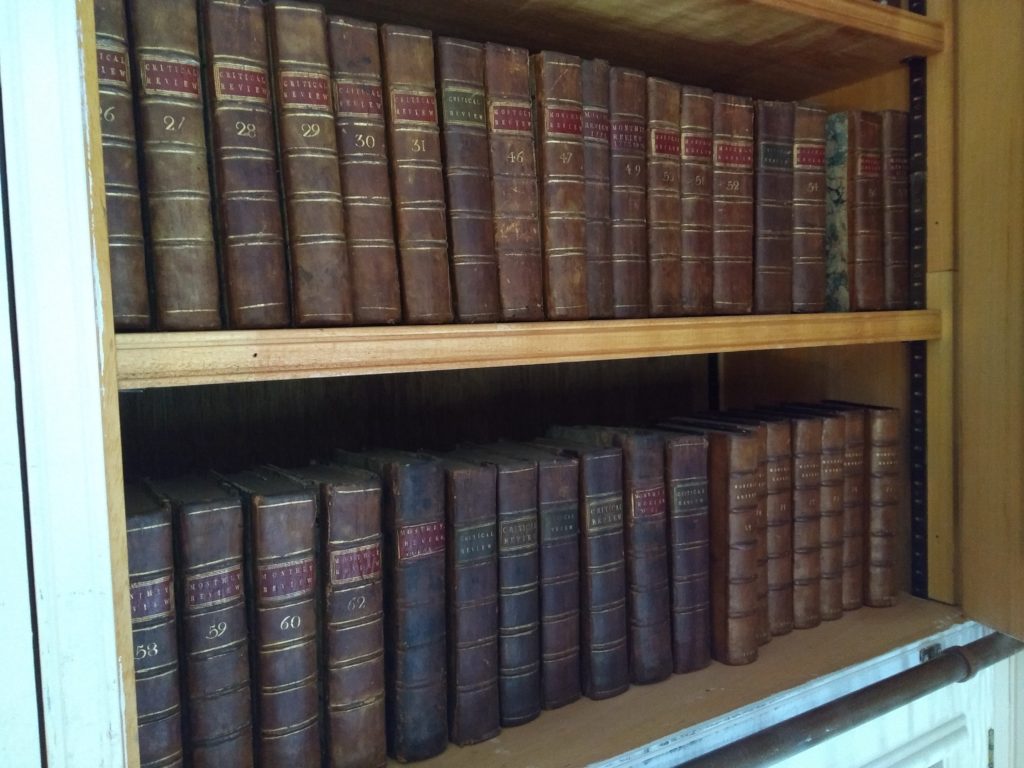
I don’t actually know whether the Library had a subscription to these reviews, or if they were part of a bulk donation in later years, but I find it really interesting that there were two subscription changes; firstly from the Critical Review to the Monthly Review in 1772 and then back again in 1781. Both magazines were in publication well into the 19th Century, so it’s not as if one had stopped for a time. The Monthly Review was the older, being founded in 1749, and the Critical Review was set up as a rival in 1756. Being a frugal Yorkshireman, I wonder if the prices went up for one and not the other and this prompted a subscription swap, but I have no evidence with which to back this up!
With so many reviews to explore, I decided to start by trying to find books in the Library collection that may have been reviewed in the magazines, and I was fortunate to quickly stumble upon a review of Pennant’s Tour in Scotland. Thomas Pennant was a naturalist who, well, went on a Tour of Scotland in the late 1760s and his account of the trip was very highly regarded. It was therefore very exciting to read a contemporary review of the book that highlights just how well received it was. Scotland at this time was, well, shall we say, not seen in the best light by many Englishman, and the review highlights this point with this quite fabulous pair of paragraphs…
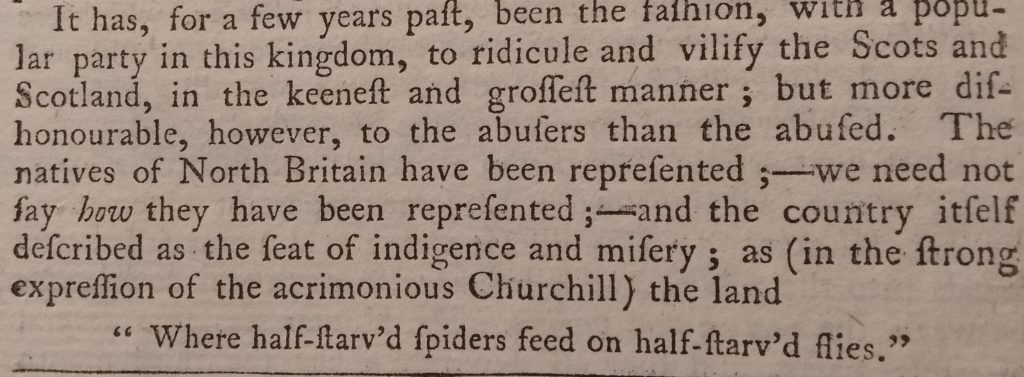

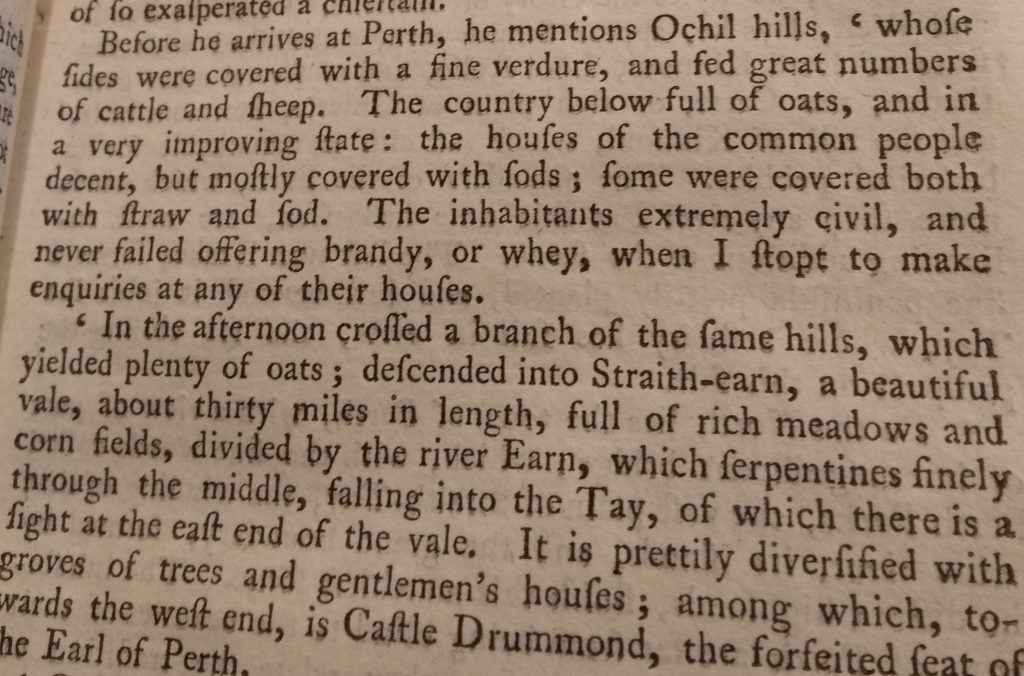
The extremely positive tone continues throughout the review. Interestingly, the review quotes extensively from the book and is as much a summary of the book’s contents as it is an actual review of the content. Given the novelty of this work, it is perhaps possible that the reviewer felt the need to give a large amount of detail as to the topics covered to his audience in order to help them better understand its purpose. As an example, see the section to the right that covers Strathearn. (NB frequent readers of the Innerpeffray blog may be wondering why I’ve not chosen the passage that covers Innerpeffray – this is because Pennant’s original tour was such a success that he went BACK a few years later and wrote a follow-up that also included the Hebrides. Innerpeffray was only visited on that second visit.)
Whilst looking in another volume of the Monthly Review for reviews of books concerning the American War of Independence, I came across a review for another of the Library’s books; Coryat’s Crudities, featured in Episode 2 of the Tour of the Tops.
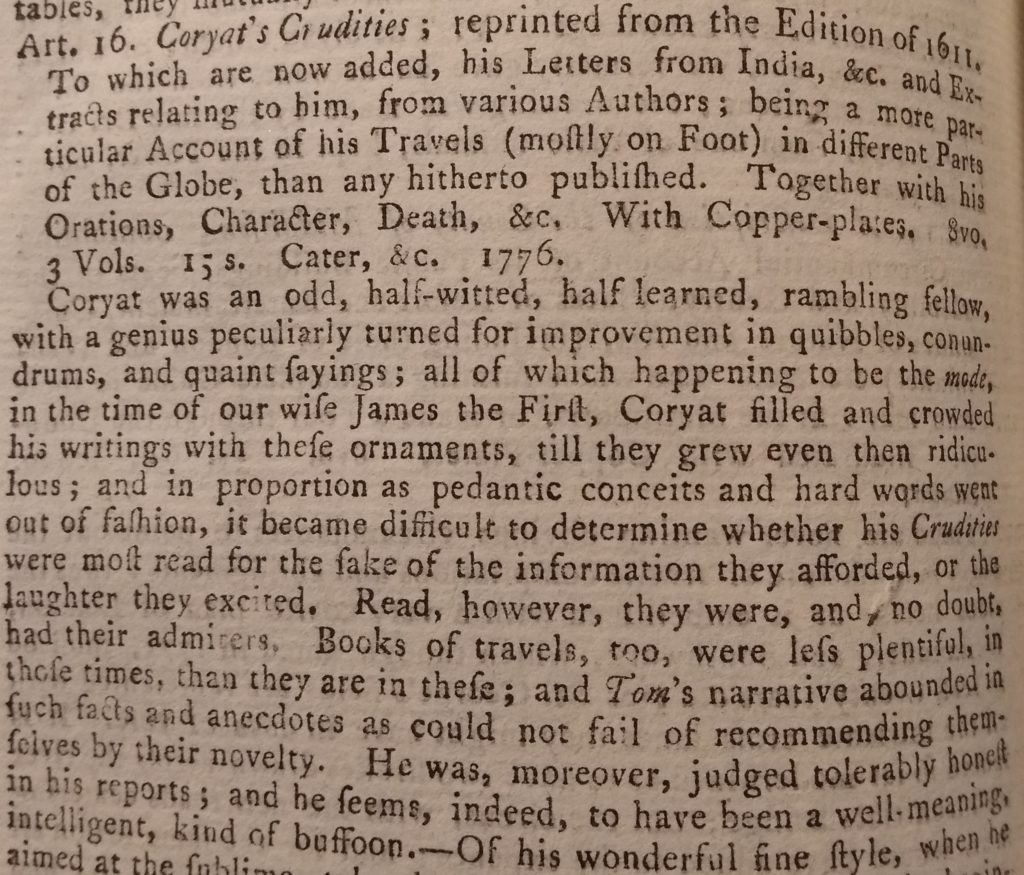
Having read Coryat’s Crudities, I think this is one of the most superb reviews one could have of the book. I love the description of him as an “odd, half-witted, half learned rambling fellow” and a “well-meaning, intelligent, kind of buffoon”. If you, dear reader, have words as kind as these for me, then I would feel that I have done my job well in these tours! As this is a reprint, it is also a chance to see a bit of historiography in action – seeing the early 17th Century from the viewpoint of the late 18th. I have to agree with the querying as to whether the books were read for amusement or as serious sources of information on travel – one suspects the former overruled the latter in Coryat’s case! It is also interesting to note the reference to books of travels being more plentiful in the late 18th Century than in Coryat’s day; evidence already of the impact that Pennant’s Tour had had even within a few years of its publication.
We move on now to look at the American War of Independence. One of the most popular books in the Library is the Scots Magazine of 1776, which contains a most entertaining rebuttal of the Declaration of Independence, as well as the full text of the Declaration itself. I thought it would be interesting to see what kind of books were being published on the matter around this time, as well as seeing how they were being received in the world of the book critic. Fortunately for me, it was clear that it was as headline-dominating then as you might imagine, as there were dedicated sections to the “American Controversy” in each month of the Review (noting that the books in the Library each contain six months’ worth of book reviews). Going into each and every book would take far too long, so this is very much a curated selection to give a flavour of what was going on in late 1776.
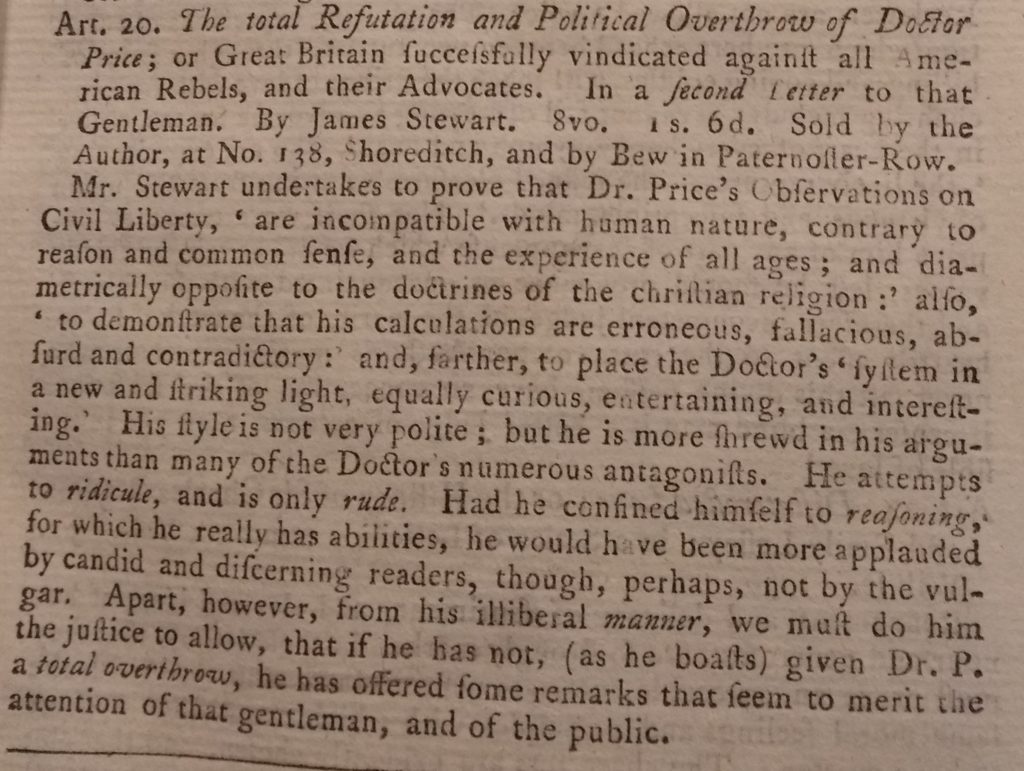
What becomes immediately apparent on looking through each month’s section on the “American Controversy” is that a certain Dr. Price seems to be the focus of interest for a large number of books, both for and against his work. On the left is a good example of a review of one of those books that seeks to discredit Dr. Price. Intriguingly, the author of the review seems to be somewhat disparaging towards this book and only grudgingly concedes that its author makes “some remarks that seem to merit the attention”.
The impression that the reviewers are pro-American is absolutely reinforced by the approach taken to other books reviewed throughout this period. Authors who dare to disagree with Dr. Price and the cause of American liberty are often ridiculed and concessions to their ability to dismantle aspects of Dr. Price’s work are only very reluctantly conceded. Authors found in agreement are easily praised. It is fascinating to me that there was such a body happy to stand in diametric opposition to the British Government at the time on this highly critical matter. The work of the Monthly Review appears to be to act as Dr. Price’s standard bearer and to defend his work against all who opposed it. Given that the reviewers were anonymous, I almost wonder if Dr. Price was among them! Before moving on to other reviews, I want to quickly show you the original review of Dr. Price’s work. However, ‘quickly’ may be somewhat difficult, as it takes about a dozen pages across two separate months of the Monthly Review. Below is a small selection of quotes taken from the review to give you a flavour.
The thrusts of Dr. Price’s arguments appear to be twofold: Firstly, there is no justification for Great Britain to force the American colonialists to submit to their will – instead, citizens of both are “fellow-subjects”. Secondly, that Great Britain is in no position to finance and support the war that would be necessary to subjugate the colonies. The review is gushing in its praise for Dr. Price, and quotes liberally from his works to support their case. It is, therefore, perhaps no surprise that the reviewers spend such time defending a work that they praise so highly.
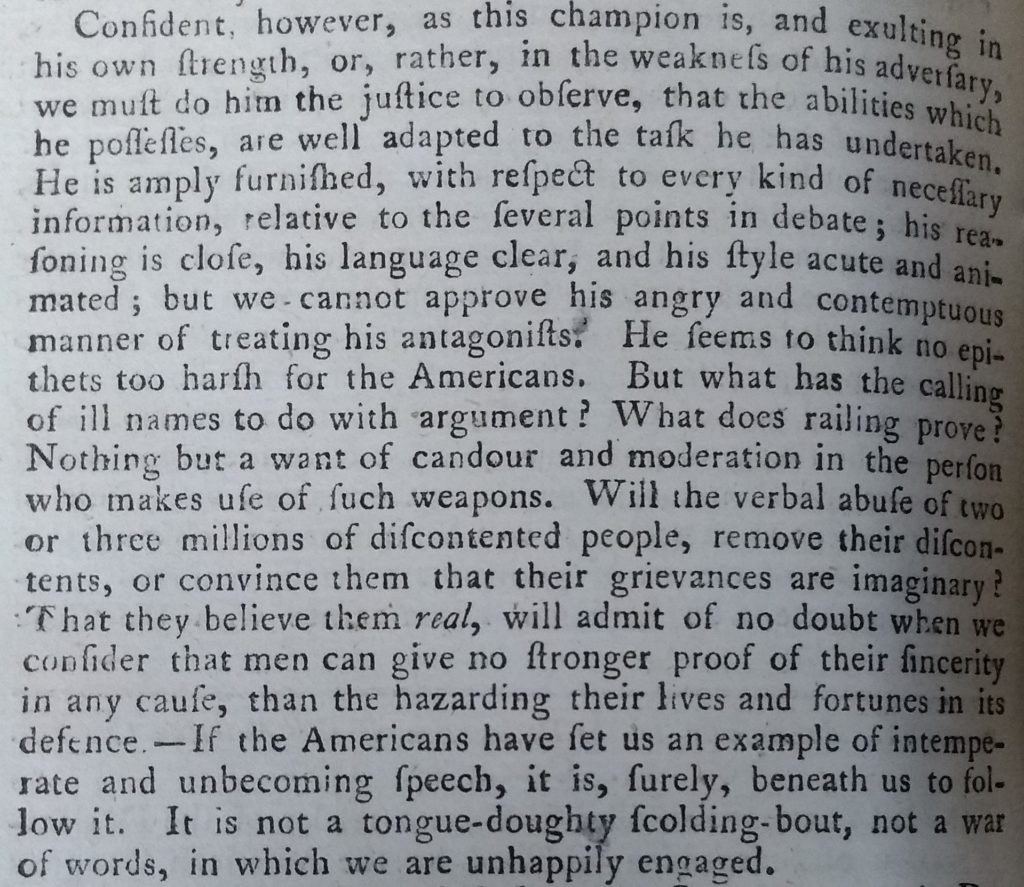
On the left, we have an extract from the review of “An Answer to the Declaration of the American Congress” and I include it here for interest as it epitomises the tone and approach taken by the reviewers when faced with books with which they completely disagree. One notes that, in the midst of the flurry of rhetorical questions, the main argument against the author is that he uses some nasty words for the Americans. I have to say that there are some choice phrases in this paragraph – my personal favourite being “tongue-doughty scolding-bout” – so I hope you enjoy reading through it!
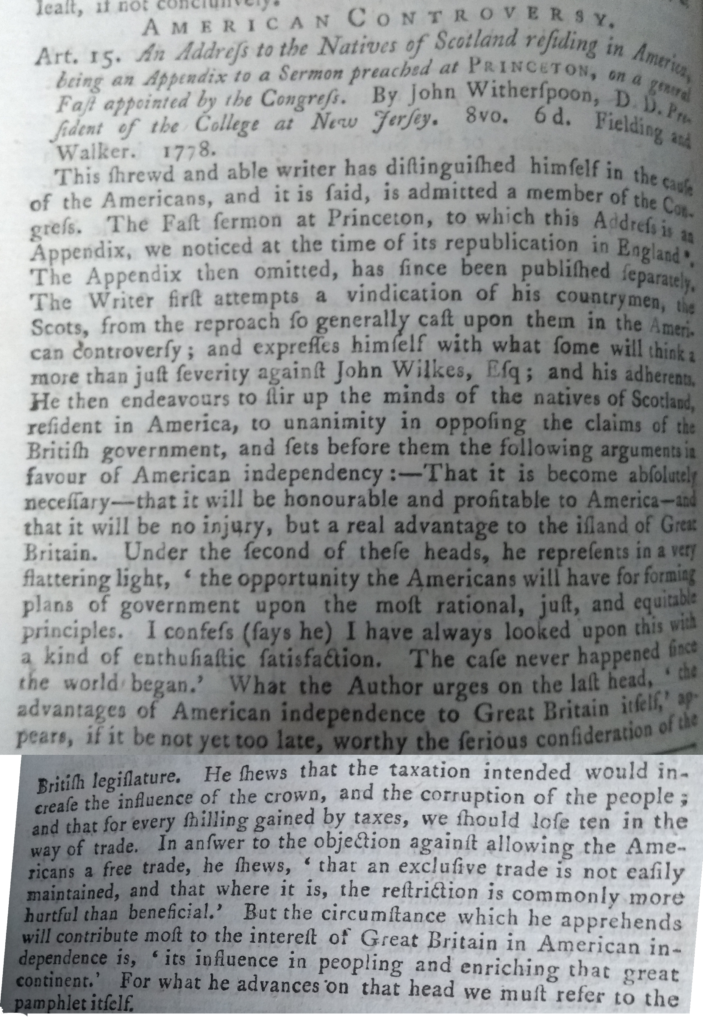
The review to the right I have selected because of its direct connections to Scotland and (almost!) the same part of the country as the Library. It is about the work of Dr. John Witherspoon, a Scotsman who was one of the first Presidents of the College at New Jersey, now Princeton University, one of the USA’s foremost seats of learning. Dr. Witherspoon had a quite adventurous life, being captured by Jacobites during the 1745/6 rebellion and imprisoned in Doune Castle for a time before escaping. He had moved to Princeton in 1768 and was a firm believer in the American Independence – to the extent that he was elected to the Continental Congress in 1776. The review of his sermon is, unsurprisingly, extremely positive as a result. It is interesting that he includes a justification for why American independence would actually be a good thing for Britain, although I am not overly sure that his sums are correct in suggesting that “for every shilling gained by taxes, we should lose ten in the way of trade”! There is also a slightly prophetic note in the final point – America’s “influence in peopling and enriching that great continent”.
Having seen how the reviewers carefully write to favour one side of the “American controversy” over the other, I thought it appropriate to end with this short section. I find it somewhat ironic that such clearly biased reviewers actually had the nerve to include this sentence in a review. It is, however, something that still resonates today as we are so good at putting ourselves into little bubbles where it is all to easy to block out dissenting voices and decide how credible an account is solely based on the opinions of its author.

I want to close out the final Tour of the Tops for 2020 with something a little more light-hearted than colonial discontent, so I present a small selection of humorous book reviews that I came across. The first few are, I’m afraid, still connected to American independence, but not in such great detail as the above extracts.

We start with this review in full. I have cropped nothing. One can only imagine the effort put into the work and the dismay of the author on receiving such a curt and somewhat harsh review as reward for their efforts!

Another short review, but again cutting in its analysis of this work! A small note – there seems to have a movement at this time to associate the concept of Liberty with that of Licentiousness, hence the title. The thrust of this was that with unfettered liberty, people would inevitably end up participating in all sorts of activities. I leave the reader to come to their own conclusion as to whether this is a fair point!
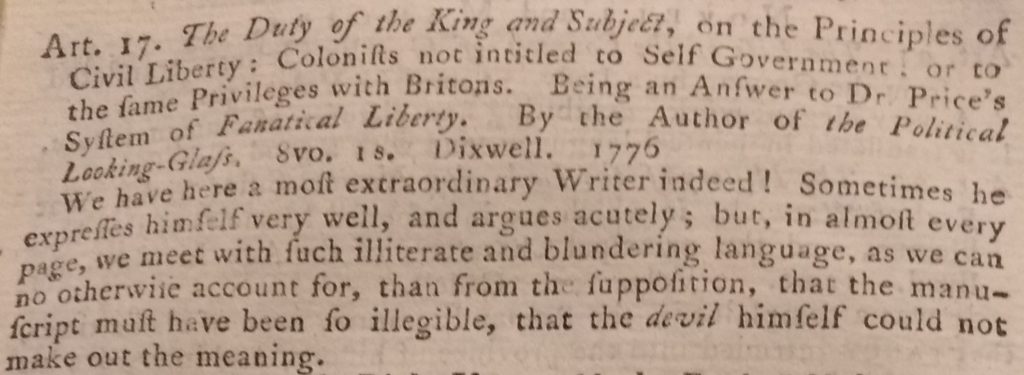
This final American-Revolution-related review (I promise!) is written in such a way that just makes you imagine the author reading it out loud as they wrote it with THE most sarcastic tone of voice! I will certainly be stealing the line “so illegible that the devil himself could not make out the meaning” given the quality of some work emails I get from time to time…

It’s amazing what people write about – perhaps almost more amazing is the fact that it was considered worthy of a review! I do enjoy the slight towards poets in general, as it is a habit that we still see today whenever millionaires are praised for charity work and donations that probably barely impact their fortunes! Still, this poem was so successful, it spawned a follow-up…

It is reassuring to see that the idea of a poem called “The Duchess of Devonshire’s Cow” was as ridiculous then as it sounds now. I should also reassure my reader that I was not looking here for obscenity! For that, well…

Yes, a poem dedicated to the greatest ***** in her Majesty’s Dominions – written by a Woman of Fashion! I refuse to make a guess as to the missing word in such a place, but it does rather shock me that a piece called “The Temple of Prostitution” would merit a mention in a book review periodical. Although, having said that, they do review some other works in a similar vein…

And so we come full circle with the “shameless catch-penny jobb” that I used for the title of this Tour. I don’t think that this book stood the test of time based on this review! The disdainful tone of the reviewer is most amusing.
So ends the sixth ‘episode’ of the Tour of the Tops with amusing snippets from book reviews! I hope that you have enjoyed the range of reviews on offer from the hardest to reach shelves of Innerpeffray! As the Library has now descended into hibernation for the winter, the “Tours” will be taking a break until March. With these reviews, we have finished the first six cases of the Library and so 2021 will see us take a 90 degree turn and head along the back wall. I look forwards to sharing more finds with you then!


